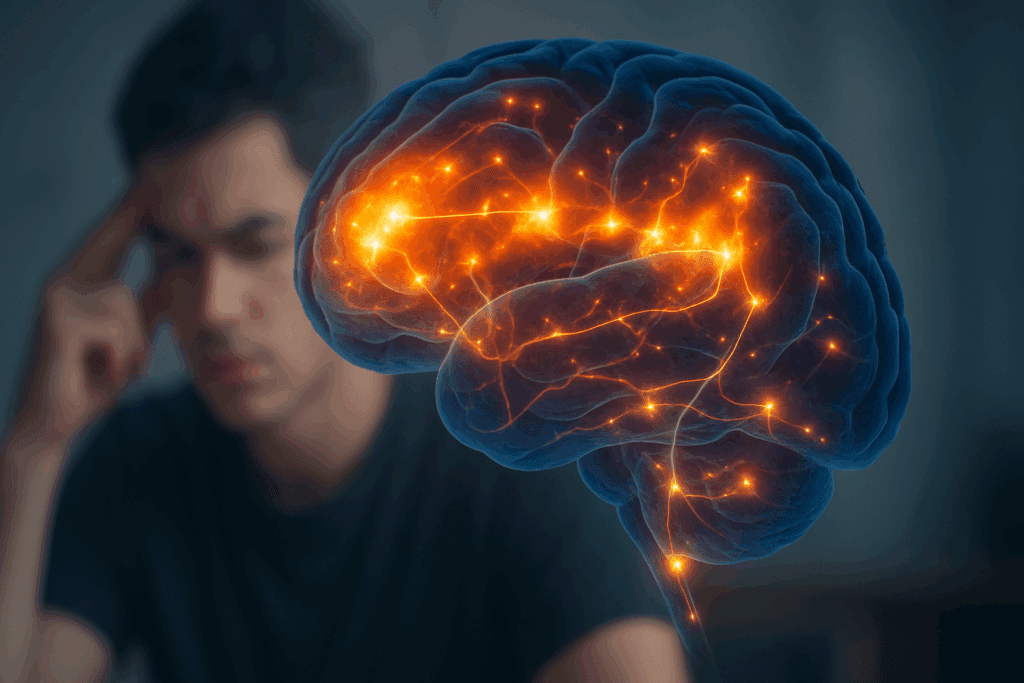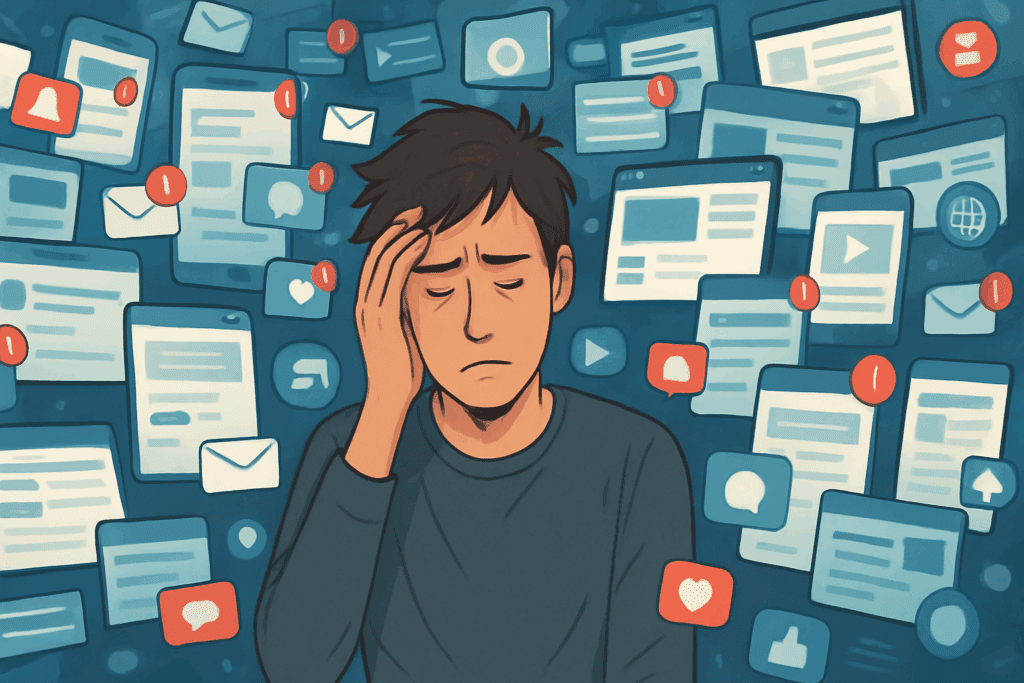Understanding the Modern Attention Crisis
In a world designed to hijack our focus, it’s no wonder so many people are asking, Why is my attention span so short? If you find yourself struggling to follow through on a task, zoning out during conversations, or jumping between tabs every few minutes, you’re not alone. Attention spans today are not just short—they’re shrinking. Research suggests that our ability to concentrate has taken a significant hit over the last two decades, largely due to the overstimulation that defines modern life. But while environmental factors play a large role, biology, lifestyle, and mental health are deeply interwoven into the fabric of our focus capabilities.
Our attention system evolved for survival, tuned to detect subtle changes in the environment—like a rustle in the bushes or a flicker of movement in the periphery. That same sensitivity now makes us hyper-reactive to pings, pop-ups, and multitasking demands. The result? A low concentration span and a reduced capacity for deep, sustained focus. In addressing this issue, we need to look not only at what distracts us, but also at what supports and restores our brain’s natural ability to concentrate.
You may also like: How to Improve Focus and Concentration: Proven Techniques for Boosting Mental Clarity and Productivity

The Neurobiology of Focus and Distraction
Understanding why we lose focus starts with the brain. Concentration is a high-level cognitive function regulated primarily by the prefrontal cortex, which oversees attention, decision-making, and working memory. When this area is functioning optimally, it acts as a conductor, directing mental energy toward relevant tasks. But when it’s underactive—whether due to fatigue, stress, or neurological imbalance—the result is a poor attention span and increased susceptibility to distraction.
Neurotransmitters like dopamine and norepinephrine also play vital roles in attention regulation. Dopamine, often associated with reward and motivation, is especially important. If dopamine signaling is disrupted, which is common in ADHD and mood disorders, people may find themselves plagued by a bad attention span. Similarly, norepinephrine helps modulate arousal and focus, especially under stress. Disruptions in either can lead to a short concentration span that persists even when we try to stay on task.
The brain’s default mode network (DMN), active during rest or mind-wandering, is another key player. For many individuals with a small attention span, the DMN may remain excessively active, pulling attention inward and away from external tasks. This interplay of brain regions and chemical messengers explains why improving attention span is more complex than just turning off notifications—it requires a deeper understanding of what’s happening under the surface.

Digital Overload and the Attention Economy
Technology’s role in fragmenting our focus cannot be overstated. The devices we rely on daily—smartphones, tablets, and laptops—are engineered to keep us scrolling, clicking, and returning for more. Every notification triggers a small dopamine release, reinforcing the habit and making it harder to concentrate without external stimulation. This cycle feeds into a short concentration span that becomes the new baseline.
Moreover, the constant switching between apps, messages, and content fragments our cognitive resources. Known as “task-switching cost,” this mental toll makes it harder to refocus after each interruption. Over time, these micro-distractions lead to a chronically low span of attention, even during non-digital activities. When people ask how to fix attention span issues, they often overlook how deeply digital behavior rewires the brain’s reward and focus systems.
The attention economy thrives on our mental restlessness, making it essential to reclaim our cognitive sovereignty. This doesn’t mean abandoning technology but learning to use it intentionally. Setting screen limits, creating distraction-free environments, and establishing tech-free routines can all help reverse the effects of poor concentration span habits created by modern devices.

Psychological Contributors to a Short Attention Span
While environmental triggers are significant, they often interact with psychological variables that influence how we direct our focus. Stress, anxiety, and depression all impair executive functioning, making it harder to sustain attention. Chronic stress, for example, floods the brain with cortisol, which impairs prefrontal cortex function over time. This can lead to a persistent state of cognitive fatigue and an ever-dwindling attention span.
Anxiety disorders are another common contributor to a bad attention span. When the brain is preoccupied with worry, it’s unable to fully engage with the task at hand. This internal preoccupation mirrors external distractions in its capacity to splinter concentration. Similarly, depressive states often result in a low concentration span, as motivation and cognitive processing speed both decline.
Understanding these psychological influences is key to determining how to get a better attention span. Mental health treatment—whether through therapy, mindfulness practices, or medication when appropriate—can dramatically improve cognitive clarity. By addressing the emotional and cognitive noise that competes for our attention, we create space for deeper focus to reemerge.
How Nutrition and Lifestyle Habits Influence Cognitive Focus
Attention is not just a mental process—it’s a physiological one. What we eat, how we sleep, and how much we move all have profound effects on brain function. A nutrient-deficient diet can deplete neurotransmitter reserves, exacerbating symptoms of a poor attention span. For instance, omega-3 fatty acids, found in fatty fish and flaxseeds, are essential for neuronal membrane fluidity and communication. Deficiencies in these fats have been linked to attention difficulties in both children and adults.
B vitamins, especially B6, B12, and folate, support neurotransmitter synthesis and energy production in the brain. Many people with a low concentration span benefit from improving their intake of these critical nutrients, whether through food or supplementation. Hydration also plays a surprisingly significant role—dehydration has been shown to impair short-term memory, reaction time, and attention span.
Physical activity supports brain health by increasing blood flow and stimulating the release of the brain-derived neurotrophic factor (BDNF), a protein that promotes neuronal growth and plasticity. Regular exercise has been associated with improved executive function and may offer a natural strategy for how to regain attention span without medication. Similarly, sleep is foundational. Sleep deprivation reduces attention span, slows information processing, and impairs decision-making. Prioritizing restorative sleep may be one of the most powerful ways to fix a short attention span naturally.
The Role of Mindfulness and Meditation in Regaining Focus
Mindfulness isn’t just a trendy buzzword—it’s a scientifically validated method for improving attention regulation. Numerous studies have demonstrated that consistent mindfulness practice enhances activity in brain regions associated with focus, emotion regulation, and working memory. For those wondering how to increase attention span sustainably, mindfulness offers a practical, accessible starting point.
Through practices like breath awareness, body scanning, and open monitoring, individuals train the mind to return to the present moment. This repeated redirection strengthens the mental “muscle” responsible for sustained attention. Research from Harvard has shown that even eight weeks of mindfulness training can result in measurable increases in gray matter density in the prefrontal cortex, a key region involved in focus and impulse control.
Meditation also reduces activity in the default mode network, which, as noted earlier, can be overly active in individuals with a small attention span. By quieting this internal chatter, mindfulness allows cognitive resources to be reallocated to the task at hand. Whether practiced for five minutes a day or as part of a more intensive routine, mindfulness represents a highly effective way to get a better attention span over time.
How I Got My Attention Span Back: Real-Life Strategies That Work
For many, the journey to reclaiming focus is deeply personal. Anecdotal and clinical accounts alike point to the power of consistent, incremental changes. One individual struggling with a chronically poor attention span found that beginning the day with a 10-minute journaling practice helped establish intentionality and reduce mental clutter. This was followed by short, focused work sprints using the Pomodoro technique 25 minutes of deep work followed by 5-minute breaks.
Others have shared how exercise routines, particularly morning walks or yoga sessions, helped reset their mental state for the day. Movement appears to prime the brain for cognitive activity, making subsequent tasks easier to sustain. One especially compelling strategy for how to fix short attention span issues involved eliminating background noise. Swapping distracting music or television for silence or ambient nature sounds created an environment conducive to deep focus.
Across these personal stories, a common theme emerges: regaining focus is not about finding a single silver bullet, but rather building a lifestyle that supports cognitive health. From nutrition and movement to mindset and digital boundaries, multiple elements must align. But the good news is that improvement is not only possible—it’s probable with dedication and the right approach.
The Link Between Aging, Brain Health, and Attention Decline
As we age, changes in brain function can also contribute to a reduced attention span. Neuronal loss, reduced dopamine activity, and slower information processing all play a role in what may feel like a gradually worsening ability to concentrate. For many older adults, this presents as a low span of attention that interferes with reading, conversation, or decision-making.
However, age-related attention decline is not inevitable. Neuroplasticity—the brain’s ability to reorganize and adapt—remains intact well into late adulthood. Activities that challenge the brain, such as learning a new language, playing a musical instrument, or engaging in strategic games like chess, can help strengthen focus and working memory. These pursuits are not only mentally stimulating but have been associated with better long-term cognitive outcomes.
Nutritional support is especially important in this stage of life. Deficiencies in vitamin B12 and folate are more common among older adults and can significantly impair cognition. Addressing these imbalances through diet or supplementation is one of the simplest, evidence-backed ways to improve attention span in aging populations. Ultimately, preserving focus in later years depends on maintaining an active, nutrient-rich, and intellectually engaging lifestyle.
Breaking the Multitasking Myth and Embracing Single-Tasking
Multitasking has long been hailed as a badge of productivity, but research has consistently shown that it undermines rather than enhances cognitive performance. Switching between tasks taxes the brain’s executive resources, leading to increased errors, slower progress, and a fragmented sense of accomplishment. This constant cognitive juggling is a leading contributor to a short concentration span.
By contrast, single-tasking—focusing on one task at a time—promotes deeper engagement and better retention of information. Studies have shown that people who practice single-tasking report a greater sense of clarity, reduced stress, and a noticeable improvement in cognitive stamina. For anyone looking to fix attention span problems, abandoning the myth of multitasking is a necessary step.
Strategies to support single-tasking include scheduling focused work blocks, turning off unnecessary notifications, and using tools like website blockers or time-tracking apps to stay accountable. Creating dedicated environments for different types of tasks (work, relaxation, meals) also conditions the brain to engage more fully with the activity at hand. These small but powerful changes can help reverse the habits that lead to poor concentration span.
How to Lengthen Attention Span Through Cognitive Training
While lifestyle changes are crucial, targeted cognitive training can also improve focus. Brain training exercises, when designed with evidence-based principles, can enhance working memory, processing speed, and attentional control. These exercises may include memory-matching games, dual n-back tasks, and timed concentration drills that challenge the brain to sustain attention for longer periods.
Some of the most effective programs are those that adapt in difficulty based on user performance. This personalized challenge ensures continued growth and neuroplastic engagement. Over time, such training has been shown to yield measurable gains in both clinical and everyday settings, making it a viable strategy for those wondering how to improve attention span without pharmaceutical intervention.
That said, cognitive training works best as part of a holistic approach. Combined with sleep optimization, stress management, and nutritional support, it can amplify results. Consistency and variety are key—just as physical fitness requires regular and varied workouts, so does cognitive enhancement.

Frequently Asked Questions: Improving Attention Span and Brain Health
1. Why is my attention span so short, even when I try to focus?
Even with intentional effort, many individuals struggle to maintain focus due to a range of overlooked factors. One contributing element is mental fatigue from decision overload, which reduces cognitive bandwidth and makes it harder to engage deeply with tasks. When your brain is already juggling unresolved to-do lists, intrusive thoughts, or emotional stress, its ability to concentrate diminishes significantly. Environmental influences like chronic background noise or poor lighting can also impair neural efficiency without your even realizing it. If you’re asking, “Why is my attention span so short?” it may not just be about distractions—it could also reflect unmet cognitive needs such as novelty, purpose, or intellectual stimulation. Addressing these less obvious variables is essential for restoring clarity. To truly understand why your attention span is so short, it helps to evaluate your lifestyle holistically. Are you sleeping deeply? Are your nutrition and hydration consistent? These foundational aspects dramatically influence the brain’s capacity to filter out noise and prioritize focus. Enhancing cognitive stamina may also require deliberate periods of rest, as rest supports neuroplasticity and long-term attention gains. Ultimately, improving mental clarity often involves working smarter, not just harder, to reduce the root causes of persistent focus disruptions.
2. What are effective strategies for increasing attention span in high-pressure environments?
Increasing attention span in high-pressure situations requires more than just willpower; it demands smart, evidence-backed interventions that strengthen cognitive resilience. In these environments—whether fast-paced workplaces, academic testing centers, or demanding home settings—your nervous system is often in a heightened state. This can lead to impulsive reactions and a short concentration span due to adrenaline and cortisol surges. One practical method to counteract this is pre-performance ritualization: using structured, calming habits like deep breathing, mental rehearsal, or positive self-talk before engaging in tasks. These rituals signal to the brain that it’s safe to enter a focused state. Another technique for increasing attention span involves breaking large challenges into micro-goals, which helps the brain manage stress without slipping into overwhelm. Biofeedback and wearable tech are also being used in elite performance environments to detect when cognitive attention is waning, allowing for real-time course correction. Supplements like L-theanine and Rhodiola rosea, though not a substitutes for healthy habits, can offer temporary mental clarity under acute pressure. Most importantly, training yourself to recognize early signs of cognitive overload empowers you to adjust strategy and re-center. In contexts where staying sharp is non-negotiable, knowing how to increase attention span becomes a critical asset in maintaining both productivity and mental well-being.
3. Why do I have a short attention span when I’m not even stressed or distracted?
It’s a common misconception that a short attention span only arises when you’re anxious or overwhelmed. In reality, low cognitive engagement—essentially boredom—can also result in a short concentration span. When the brain isn’t sufficiently stimulated, it begins scanning for novelty, even in the absence of external distractions. This can lead to task abandonment, daydreaming, or repeated urges to check your phone, despite no apparent stressor. If you’re asking, “Why do I have a short attention span?” during seemingly calm moments, it may be that the task lacks emotional relevance or personal significance. Cognitive neuroscience suggests that attention is intimately tied to motivation. Tasks that align with your values or spark curiosity tend to hold your focus more naturally. Another potential reason could be latent mental fatigue from previous exertion, even if you’re currently relaxed. Low blood sugar or dehydration can also quietly impair executive functioning. To improve your focus during these lulls, consider adding a challenge component to the task or pairing it with a reward. Creating a meaningful context for otherwise mundane tasks often transforms how the brain prioritizes attention. Understanding the root of your small attention span is about more than eliminating stress—it’s also about cultivating meaning and engagement.
4. How do social media habits contribute to a poor attention span over time?
Social media’s influence on attention isn’t just about distraction—it’s about the reconditioning of your brain’s reward circuits. Every scroll, like, or share triggers a dopamine response, reinforcing short bursts of novelty-seeking behavior. Over time, this rewires your baseline for stimulation, making sustained tasks seem dull in comparison. That’s why many people experience a poor attention span even during activities they once enjoyed. When asking how to fix attention span problems, it’s important to recognize that social platforms are designed to fragment your focus into bite-sized moments. The constant exposure to rapidly changing content trains the brain to expect—and seek—instant gratification. This contributes to a low span of attention and makes longer tasks feel more laborious. Even brief social media use between tasks can increase task-switching costs and reduce deep work capacity. The solution isn’t necessarily complete abstinence but building boundaries. Consider implementing screen fasts, using grayscale settings, or scheduling digital detox hours. Reclaiming your ability to focus involves not just removing distractions, but retraining your brain to find satisfaction in longer, more fulfilling forms of engagement. Rebuilding from a poor concentration span often starts with reevaluating your digital diet.
5. What role does emotional regulation play in how to improve attention span?
Emotional regulation is a foundational skill in cognitive performance, yet it’s often overlooked when discussing how to improve attention span. Emotions like frustration, boredom, or self-doubt subtly hijack working memory and attention, even if they don’t escalate into full-blown stress responses. When emotional states aren’t acknowledged and processed, they act like background apps draining mental bandwidth. This leads to a bad attention span that feels inexplicable because its source isn’t external—it’s internal. Techniques such as cognitive reappraisal, gratitude journaling, and self-compassion practices enhance emotional flexibility and allow for faster cognitive recovery. These strategies train the brain to pivot out of negative loops and return to focus. This is especially useful for people with a low concentration span during tasks that trigger imposter syndrome or fear of failure. Bio-emotional feedback techniques—like monitoring heart rate variability—are also being used in cognitive training programs to help users understand the emotional patterns behind their attention lapses. If you’re wondering how to get a better attention span, developing your emotional regulation toolkit may offer the most surprising gains. Resilience in focus begins with calm and clarity within.
6. Can poor posture or body mechanics contribute to a low concentration span?
Surprisingly, yes—physical posture and ergonomics can significantly affect mental stamina and attention quality. Poor posture, especially when seated for long hours, can restrict blood flow to the brain and compress respiratory function. This reduces oxygenation and contributes to cognitive fatigue, a lesser-known factor behind a low concentration span. Slumped posture also sends subtle emotional signals to the brain, often associated with low mood or disengagement, which further diminishes alertness. People struggling with a consistently poor concentration span might not consider how their workspace setup influences cognition. Standing desks, posture-supportive chairs, and periodic movement breaks can help improve neural activation. Furthermore, somatic awareness practices like Feldenkrais Method or Alexander Technique enhance the mind-body connection and promote conscious engagement. Attention isn’t just mental—it’s physical. By optimizing how your body supports your brain, you set the stage for deeper, more sustainable focus. This biomechanical perspective opens a new pathway for those exploring how to fix short attention span issues through holistic means.
7. How do chronic inflammation and gut health affect how to regain attention span?
Emerging research in neuroimmunology shows that inflammation—especially chronic, low-grade systemic inflammation—can significantly impair brain function. Cytokines, the immune system’s chemical messengers, can cross the blood-brain barrier and alter neurotransmitter production. This disrupts dopamine pathways critical for focus and motivation, which is one reason people experience a poor attention span even with adequate rest. Gut health plays a major role in modulating inflammation. An imbalance in gut microbiota can lead to intestinal permeability or “leaky gut,” allowing pro-inflammatory compounds to enter circulation. If you’re exploring how to regain attention span, addressing your gut-brain axis could be a crucial step. Probiotic foods, prebiotic fibers, and anti-inflammatory nutrients like turmeric, ginger, and omega-3s support cognitive resilience. Integrative medicine practitioners often recommend stool testing to identify microbial imbalances that correlate with cognitive symptoms. This biological lens provides an innovative framework for improving attention span that goes beyond brain-centric models. Healing your gut may hold surprising answers for how to gain your attention span back in a lasting, root-cause way.
8. What cognitive therapies or practices help lengthen attention span long term?
Cognitive behavioral therapies (CBT) and metacognitive training are two powerful tools for those interested in how to lengthen attention span sustainably. Unlike quick hacks, these approaches build self-awareness and cognitive flexibility, which are essential for long-term focus gains. CBT techniques like thought challenging and behavioral activation reduce internal distractions such as worry or self-criticism. Meanwhile, metacognitive practices teach individuals to monitor and adapt their attentional strategies in real time. This might include reflecting on when your focus wavers and creating mental cues to re-engage. Acceptance and Commitment Therapy (ACT) is another emerging field that blends mindfulness and value-based goal setting to improve concentration. These therapies are particularly effective for people with a bad attention span stemming from overthinking or perfectionism. For children and adults alike, attention training programs such as neurofeedback and digital therapeutics (e.g., EndeavorRx) are showing promise in clinical settings. Long-term success in how to fix attention span problems requires more than temporary stimulation—it involves retraining your mind’s relationship with attention itself.
9. How do seasonal changes or circadian rhythms affect a small attention span?
Seasonal shifts and circadian misalignment can directly influence focus, particularly in individuals already struggling with a small attention span. During winter months or in low-light environments, the body produces more melatonin, which can blunt alertness and motivation. For those with seasonal affective tendencies, this can exacerbate an already low span of attention. Similarly, disruptions to circadian rhythms—due to jet lag, night shifts, or excessive screen use at night—can delay sleep onset and impair sleep architecture. This compromises cognitive function the next day, regardless of total sleep duration. People exploring how to get a better attention span should assess whether their daily schedule aligns with their chronotype (morningness or eveningness preference). Light therapy, consistent wake times, and meal timing have all been shown to help reset circadian function. Additionally, aligning deep-focus work with natural peaks in alertness—typically mid-morning or early afternoon—can dramatically improve productivity. Circadian-informed attention strategies represent a frontier in personalized brain health and offer exciting implications for how to fix short attention span symptoms at their biological root.
10. What are some real-life success stories of how I got my attention span back?
Many individuals who have overcome a bad attention span describe their journey as one of layering small, intentional changes rather than discovering a single transformative solution. One tech professional reported that tracking his energy peaks using a wearable helped him restructure his workday, dedicating his most focused hours to deep work and reserving admin tasks for low-energy periods. Another individual struggling with a consistently poor attention span embraced analog tools—paper planners, offline timers, and even physical books—to reduce digital dependency. Someone else found that engaging in improv theater classes unexpectedly improved their mental flexibility and responsiveness, which in turn enhanced sustained attention in work meetings. Others have described how journaling about their attention lapses helped uncover emotional triggers they hadn’t recognized. These stories illustrate that when people explore how I got my attention span back, they often land on personalized, multi-layered approaches. The most consistent pattern is that regaining focus is a lifestyle shift, not a single fix. With curiosity, patience, and the right strategies, it’s entirely possible to reclaim clarity and focus in an increasingly distracted world.

Conclusion: Restoring Focus and Reclaiming Mental Clarity in a Distracted World
If you’ve ever asked yourself, “Why do I have a short attention span?” the answer likely lies at the intersection of biology, environment, and lifestyle. From the neurochemical imbalances that govern focus to the constant barrage of digital interruptions, modern life presents numerous challenges to sustained attention. But while these obstacles are real, they are not insurmountable.
Learning how to fix attention span issues starts with awareness—recognizing the sources of distraction, understanding the brain’s needs, and choosing daily practices that support mental clarity. Whether it’s through nutrition, mindfulness, sleep, exercise, or cognitive training, there are concrete, research-backed ways to improve attention span over time. The process may take effort, but the payoff—a calmer, clearer, more focused mind—is well worth the investment.
So if you’re wondering how to get a better attention span, know that you’re not alone, and that the tools to change are well within reach. Rebuilding focus is not just about avoiding distractions—it’s about nurturing the conditions that allow your brain to thrive. In doing so, you not only reclaim your productivity and peace of mind, but you also support long-term brain health and cognitive longevity in a world that desperately needs more presence, not less.
Further Reading:
What Are the Causes of a Short Attention Span, and How Can I Improve It?
Pay attention to concentration Here are reasons you may have trouble staying focused.
Your attention span is probably shorter than it used to be. How to fix it


